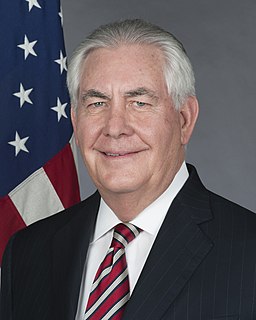A Quote by Cory Gardner
As a result of the strategic patience policy, we now have North Korea testing four times an atomic weapon; they've violated numerous United Nations sanctions, U.S. sanctions by launching ballistic missile tests.
Related Quotes
During the periods when South Korea played a more active role, the inter-Korean relationship was more peaceful, and there was less tension between the United States and North Korea. The last U.S. administration pursued a policy of strategic patience and did not make any effort to improve its relationship with North Korea. Also, the previous Korean government did not make any such efforts. The result is the reality you see today - North Korea continuing to advance its nuclear and missile program.
Since the advent of the atomic bomb, the United States has always needed two kinds of enemies. On one level, it has needed a tactical enemy that it can go out and fight in the field in a shooting war. Since 1945, these enemies have been created and appeared as North Korea, North Vietnam, Grenada, El Salvador, Panama, Iraq and now Colombia. On another level, however, the US needs a strategic enemy that will justify outrageous expenditures of capital for strategic weapon systems like ICBMs, Trident submarines and "Star Wars" missile defence systems.
Although Kim Jong Un is a very unreasonable leader and has a firm, unreasonable belief that nuclear and missile weapons will protect him and his regime, we will continue to employ all possible means - sanctions, pressure, as well as dialogue - to draw North Korea to the negotiating table for denuclearization. To resolve the issue, we have to add dialogue to the current menu of sanctions and pressure.
It's important to understand the policy of the U.S. towards North Korea is to deny North Korea possession of a nuclear weapon and the ability to deliver that weapon. Our strategy has been to undertake this peaceful pressure campaign we call it enabled by the four no's.The four no's being that we do not seek regime change, a regime collapse, an accelerated reunification of the peninsula, and we do not seek a reason to send our forces north of the demilitarized zone.
I can actually approve of some of Donald Trump's North Korea policy, the sanctions, for example, doing things that other presidents would have done. But it's impossible to imagine any other president going before the U.N. General Assembly and referring to the dictator of North Korea as "Rocket Man," or issuing this series of blustery threats, which, frankly, are terrifying, and are raising the risk of a needless war.
So, I think that for the authorities to say now that calling for sanctions will prevent dialogue is a ploy to stop us from supporting sanctions. It has to be the other way around: dialogue first, then we stop our call for sanctions, because sanctions make people understand that you cannot exercise repression and at the same time expect international support.





























